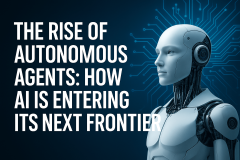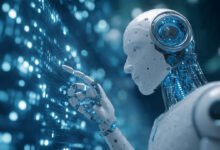The Rise of Autonomous Agents: How AI is Entering Its Next Frontier
Discover how autonomous agents are transforming industries and shaping the future of AI.

Artificial Intelligence has gone through many stages of evolution in the past decade. From rule-based systems to machine learning algorithms, and from deep learning models to generative AI, each leap has expanded what machines can do for businesses, researchers, and individuals. Yet, as impressive as generative AI has been, it still operates primarily as a reactive tool—waiting for human prompts before producing an output.
Now, a new paradigm is emerging: the era of autonomous agents. These aren’t just smarter chatbots; they are systems designed to plan, reason, and act with minimal human intervention. As we move into 2025, it’s clear that agent-driven AI systems could define the next big chapter in technology.
From Generative AI to Autonomous Agents
Generative AI, popularized by tools like ChatGPT, Midjourney, and others, demonstrated how AI could create realistic text, images, and code. However, these systems are fundamentally passive. They respond when asked but don’t proactively pursue goals.
Autonomous agents, in contrast, are designed around decision-making frameworks. They can break down a task into steps, use different tools, and execute a sequence of actions without constant supervision. For example:
- An agent could manage your calendar, negotiate meeting times, and automatically send follow-up emails.
- A research agent could browse databases, summarize findings, and compile a report.
- In software engineering, an agent could open a bug report, test a fix, and push code to production.
This marks a fundamental shift from “assistive” AI to “active” AI.
Why This Shift Matters
The movement toward autonomous agents isn’t just about convenience. It’s about scalability, efficiency, and unlocking entirely new workflows.
- Scalability: Businesses can deploy thousands of agents working simultaneously across operations, something that would be impossible with human-only teams.
- Efficiency: Repetitive tasks, such as data entry, compliance checks, or onboarding processes, can be automated end-to-end.
- Creativity: By offloading tedious tasks, humans can focus more on strategic thinking, creativity, and innovation.
- Adaptability: Agents can be programmed to respond to changing environments, adjusting strategies in real time.
The potential economic impact is enormous. Some analysts predict that agent-based AI could rival the impact of the industrial revolution by reshaping how value is created across industries.
Key Industries Benefiting from Autonomous Agents
1. Healthcare
AI agents can manage patient records, schedule appointments, and even recommend treatment plans based on medical data. Imagine a virtual nurse that not only answers questions but also monitors your health data and coordinates with doctors.
2. Finance
We’re already familiar with algorithmic trading, but AI agents could expand into personal financial planning, fraud detection, and autonomous auditing. These systems could provide individuals with 24/7 financial assistance.
3. Education
Personalized learning agents could design lesson plans, track student progress, and adapt materials based on comprehension levels. This could democratize access to high-quality education on a large scale.
4. Enterprise Operations
From supply chain management to customer support, autonomous agents can act as middle managers—delegating, following up, and reporting results without human intervention.
Challenges on the Road Ahead
Despite the promise, the shift toward autonomous agents comes with challenges.
- Ethical Considerations: How much autonomy should we give machines? Should they be allowed to make financial or healthcare decisions without human approval?
- Security Risks: An agent with access to systems could be exploited by malicious actors. Ensuring robust safeguards will be critical.
- Bias and Fairness: Agents trained on biased data may replicate or even amplify unfair outcomes.
- Regulation: Governments worldwide are still catching up with generative AI—autonomous systems may require entirely new governance models.
Addressing these concerns will determine how successfully agents are integrated into society.
Tools and Frameworks Powering the Shift
Several open-source and commercial frameworks are already enabling developers to build autonomous agents. LangChain, AutoGPT, and BabyAGI were some of the first widely known prototypes. More recently, enterprise-focused solutions are emerging, integrating agents into workflows with APIs and orchestration layers.
Cloud providers are racing to offer infrastructure specifically tailored to running agent ecosystems. This means businesses won’t just experiment with agents—they’ll deploy them at scale.
The Human-Agent Partnership
It’s important to remember that autonomous agents are not about replacing humans entirely. Instead, they represent an opportunity to create a new partnership. Humans can focus on creativity, judgment, and ethics, while agents handle complexity, data overload, and routine execution.
Think of this as moving from a “tool” model—where AI is a hammer waiting for a human carpenter—to a “colleague” model, where AI is a co-worker capable of brainstorming, collaborating, and taking initiative.
Looking Ahead
Over the next five years, we may see organizations reorganized around agent workflows. Teams of humans could be augmented by hundreds of agents, each handling different aspects of business processes. Startups might launch with fewer employees but more AI-driven operations.
At the same time, policymakers, ethicists, and technologists will need to ensure that this power is directed responsibly. If done right, agent-driven AI could become one of the most transformative shifts of the 21st century.
Conclusion
The journey of artificial intelligence has always been about extending human capability. Autonomous agents represent the next bold step in that evolution. They are not just reactive assistants but proactive collaborators, capable of managing complexity in ways humans cannot.
For businesses, researchers, and individuals, the message is clear: prepare now, experiment early, and think strategically about how these systems will reshape your world. The next era of innovation is not just about smarter machines, but about the rise of intelligent, goal-driven agents—ushering in the age of agentic AI development.











